The Dining Room at The Langham (Pasadena, CA)
The Dining Room at The Langham
1401 South Oak Knoll Ave, Pasadena, CA 91106
626.568.3900
www.thediningroom-langham.com
Sat 08/01/2009, 07:55p-12:20a
This week was a double-dose of Michael Voltaggio, a chef who's been making headlines as of late, thanks to his recent, well-publicized move from José Andrés' The Bazaar/Saam to The Dining Room, as well as his stint on the new season of Top Chef (where he'll be competing against older brother Bryan). Just two days earlier, I'd experienced Voltaggio's cooking at Breadbar's Hatchi dinner series, and my positive experience there definitely whetted my appetite for this more formal, more complete examination of Voltaggio's culinary aspirations here at The Dining Room. Early in his career, Voltaggio worked at The Ritz-Carlton in Naples, Florida, so his return to The Langham, previously a Ritz-Carlton property, seems somehow appropriate.
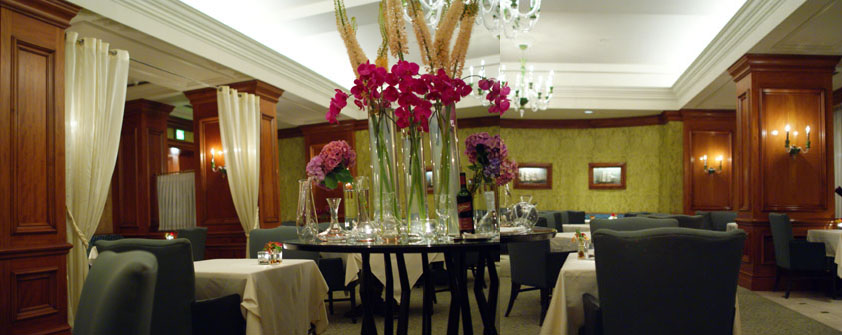
The Dining Room's decor is comfortable, classic, albeit a bit staid, and seems almost antithetical to Voltaggio's contemporary cooking. However, I've been told that next year, the entire room will be renovated to better reflect the restaurant's revamped cuisine.
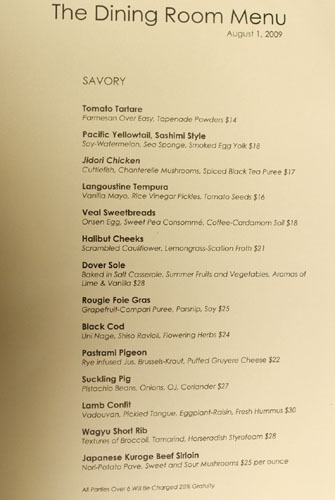
The Dining Room's highly-anticipated new menu is shown above; click for a larger version. It represents a stark change of pace from the carte of former chef Craig Strong (who's currently at Studio at The Montage). Voltaggio presents a collection of small plates, ordered from light to heavy, that blend tradition with ultramodern flourishes, highlighting local, seasonal ingredients while simultaneously embracing global influences. The recommended way to experience the cuisine is to order four courses per person (three savory, one sweet), but obviously that wouldn't be enough for moi. Given that I'd had several of the menu items at Hatchi at Breadbar just two days earlier, Chef Voltaggio prepared a special tasting menu [$110], paired with an intriguing selection of beverages chosen by Sommelier Matthew Lathan [$70].
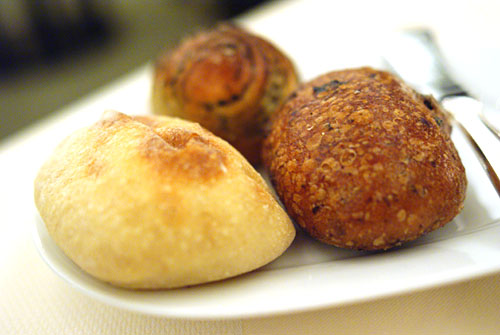
The three types of bread on offer were a country white, a truffle brioche, and an olive bread.
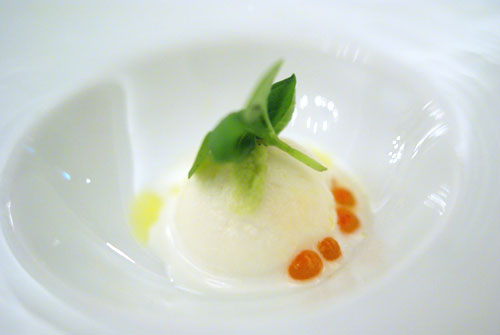
Amuse Bouche: Jasmine Rice Sorbet | Salmon Roe
We began the meal with this demisphere of sorbet, made from jasmine rice, accompanied by ikura. Also known as Thai fragrant rice, the jasmine rice lent a distinct, ricey sweetness to the sorbet that definitely perked up my taste buds, especially when accented by the briny roe. The greenery, meanwhile, gave the amuse a lingering minty finish.
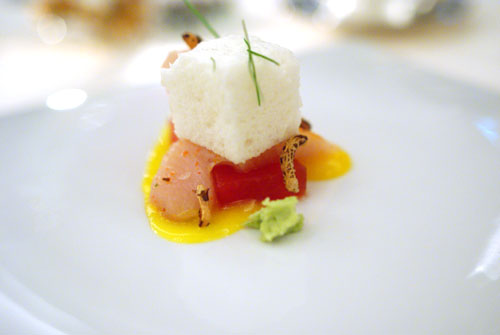
1: Pacific Yellowtail, Sashimi Style | Soy-Watermelon, Sea Sponge, Smoked Egg Yolk
Paringa, Sparkling Shiraz 2004
This was the only repeat from my meal at Hatchi, and given that it was identical, I'll just repeat what I said two days ago: "Here, we have a fascinating study in the interplay of sweet and savory. There was a lot going on, but the focus for me was the complex of hamachi, melon, and sea sponge (an admixture of dashi and gelatin). The yellowtail, in a sense, was a canvas; on one hand, it was kissed by the fruity essence of (compressed soy-) watermelon, with just a hint of rice, while on the other, the sponge and yolk provided a foil to an otherwise saccharine crudo, giving the whole amalgam a lingering, salty finish. Furthermore, the wasabi was instrumental in contributing a piquant tang, offsetting the gravitas of the rest of the dish. Finally, the wild rice gave things a delightful crunch, adding a bit of fun to a complex, contemplative dish."
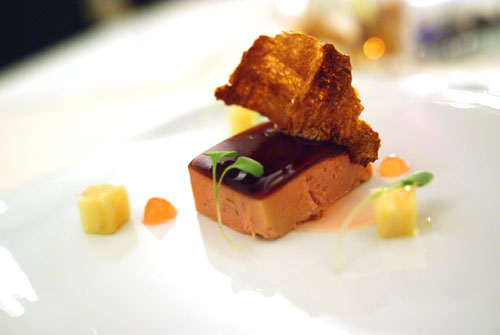
2: Rougie Foie Gras | Grapefruit-Campari Puree, Parsnip, Soy
Crios de Susana Balbo, Torrentes 2008
Upon seeing this dish, I was expecting a distinctly sweet preparation of foie, something like the cranberry gelée-topped Foie Gras Terrine at Michael Mina's XIV. Rather, it was the savoriness of the soy that stood out to me, with the bittersweet grapefruit-Campari coming only in the finish. This approach emphasized the weight, the flavor of the foie, really forcing me to examine the richness and complexities of the liver. The parsnip "bark," at the same time, added some well-placed textural variety.
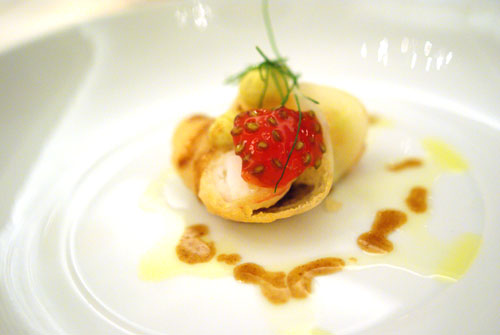
3: Langoustine Tempura | Vanilla Mayo, Rice Vinegar Pickles, Tomato Seeds
Cote du Tariquet, Chardonnay/Sauvignon 2006
Here, we have prawn, done tempura-style. The use of vanilla really emphasized the natural sweetness of the langoustine, which would've been too monolithic had it not been for the tart, tangy pickles (which had a great crunch) and "sexy tomato seeds." Both were instrumental in cutting the weight of the tempura, taking the place of tentsuyu, in a sense. I would've liked things done a bit crisper, however.
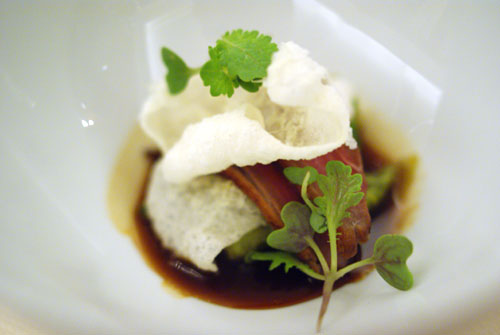
4: Pastrami Pigeon | Rye infused Jus, Brussels-Kraut, Puffed Gruyere Cheese
Trois Pistoles, Dark Ale on Lees
Apart from Saul's Pastrami (named after Saul Cooperstein, head of business development for SBE), this is Voltaggio's other signature pastrami dish. It consists of brined and marinated pigeon (Voltaggio makes it a point to emphasize pigeon, not squab) breast, crusted in spices, sliced thin. The "pastrami" is then served with puffed Gruyère, which lends an excellent weightiness to the bird, and brussels sprouts, which add a tangy vegetal component while providing a nice crunch. Finally, the pigeon is doused in a rye jus; the overall effect, which recalls the deconstructivist cuisine of Moto, is reminiscent of a Reuben sandwich.
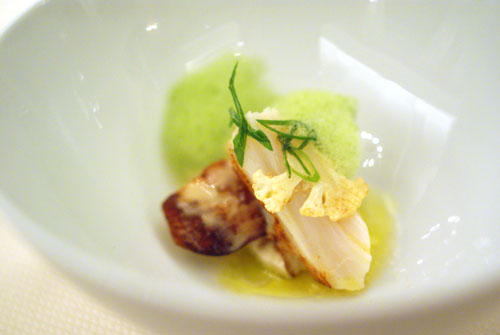
5: Halibut Cheeks | Scrambled Cauliflower, Lemongrass-Scallion Froth
Biohof, Gruner Veltliner 2006
Taken from near the head, halibut cheeks are distinct from other cuts of halibut, being sweeter, richer, and more buttery. Here, I loved the cheek's flaky, supple texture and mouthwatering flavor. I would've been happy just eating the halibut by itself, but the tart notes of lemongrass elevated the dish even further, providing a fitting foil to the fish. And the cauliflower? Wonderful. A standout for me; I wanted a bigger piece!
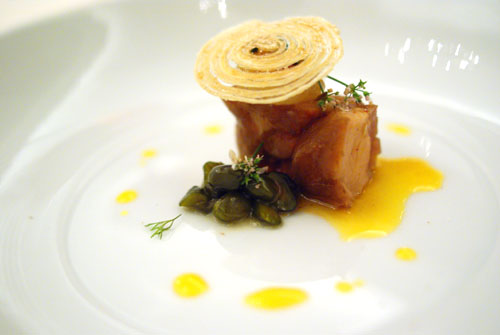
6: Suckling Pig | Pistachio Beans, Onions, OJ, Coriander
August Kesseler, Pinot Noir
A suckling pig is a young hog that's only been fed with its mother's milk, and the example here was arguably my favorite course of the night. It was immensely flavorful, as expected, with a tender, fatty consistency to boot, heightened by the sweetness of cipollini onion. The key though was the cilantro, which effectively cut the gravity of the pork while leaving a long, lingering finish of coriander on my palate. I also appreciated the pistachio, which added a nutty, crunchy element to the dish.
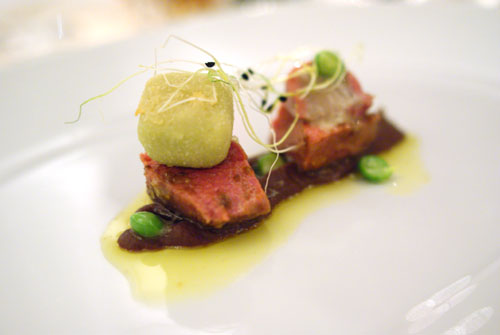
7: Lamb Chop Confit | Vadouvan, Pickled Tongue, Eggplant-Raisin, Fresh Hummus
Margerum M5 2006
Vadouvan is a spice blend commonly used in Indian cookery. Its application here was subtle, but profound, and upon tasting the dish, I instantly recalled the sensation of eating a lamb curry. However, further layers of complexity were provided by the eggplant-raisin, which gave the lamb a sweet-smoky complement, and the sprouts, which provided a bracing tang that tempered the weight of the meat. Excellent.
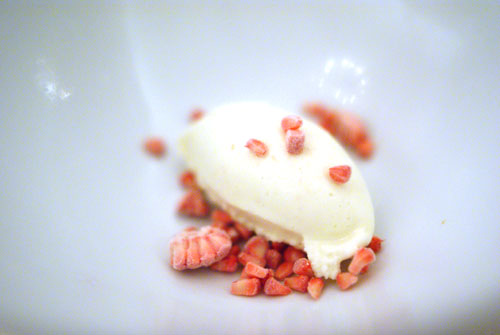
Pre-Dessert: Lemon Verbena Sorbet | Raspberry Segments
Before dessert, we were presented with this intermezzo, a sorbet infused with the quintessence of lemon verbena. It had a powerful, herbaceous, lemony smack that formed a great interplay with the sweet bits of frozen raspberry.
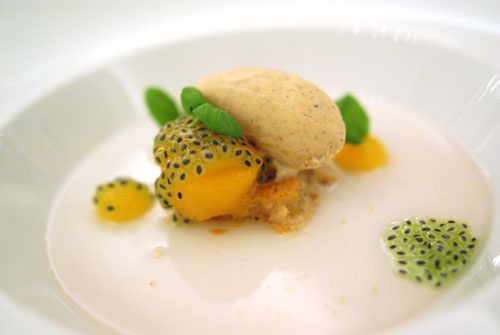
8: Warm Peach Cobbler | Coconut Streusel, Thai Basil, Brown Butter Sorbet
Hana Hou Hou Shu Sparkling Sake
A peach cobbler is basically a baked amalgamation of peach and batter, but that's only half of the equation here. What made this really work for me were the basil seeds, which lent a pungent, minty tinge to the dish, forming a great interplay with the sugary peach. The sorbet, meanwhile, added depth and a nutty potency to the dessert, while the coconut made itself known on the finish. Very nice.
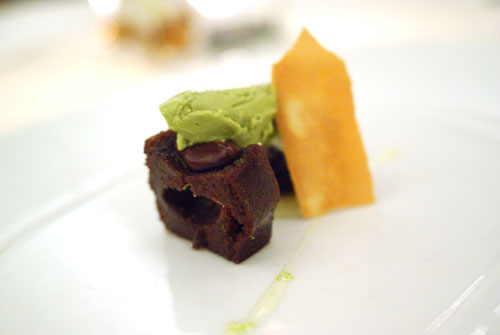
9: Chocolate-Vanilla | Baked Honey, Avocado Ice Cream, Lime
Max Ferd. Richter Graacher Himmerlicht, Riesling Spatlese
The meal proper ended with a rather innocuous-sounding "Chocolate-Vanilla." And indeed, the chocolate, and the vanilla, were fairly standard preparations. The focus here for me, thus, was strictly on the avocado ice cream. Tasting somewhat like a smooth, mild, cool guacamole, the avocado was a tad disconcerting at first I'll admit. Once it settled in though, I began to appreciate its lush, vegetal, nutty flavor and how it balanced the sweetness of the chocolate (especially when taken in concert with the mint-tarragon sauce). The baked honey crisp, meanwhile, mixed things up texturally.
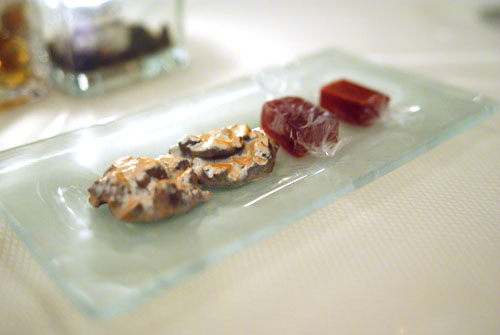
Mignardises
I first tasted the strawberry pâte de fruits, replete with edible sugar wrapper, which was akin to eating a rectangular hexahedron of strawberry jam. More interesting was the "chocolate brick" with marcona almonds, apricot, and a "surprise," which turned out to be Pop Rocks! The resulting popping, tingling sensation in my mouth made for a fun end to the evening.
On my Hatchi post, I wrote that service "left something to be desired," so I'm glad that I was able to experience Voltaggio's cuisine in an environment where it wasn't a detractor. Coordinated by Robert Hartstein, service was nearly faultless, and certainly up to the level that I expected of The Dining Room. As for the food, Voltaggio's new menu is clearly a breath of fresh air, daring but not over-the-top, an inventive blend of traditional and modern, of the foreign and the familiar. Based on this experience, I think that The Dining Room is well on its way to becoming one of the most exciting restaurants in greater LA, and I look forward to what Voltaggio and his team have in store.
1401 South Oak Knoll Ave, Pasadena, CA 91106
626.568.3900
www.thediningroom-langham.com
Sat 08/01/2009, 07:55p-12:20a
This week was a double-dose of Michael Voltaggio, a chef who's been making headlines as of late, thanks to his recent, well-publicized move from José Andrés' The Bazaar/Saam to The Dining Room, as well as his stint on the new season of Top Chef (where he'll be competing against older brother Bryan). Just two days earlier, I'd experienced Voltaggio's cooking at Breadbar's Hatchi dinner series, and my positive experience there definitely whetted my appetite for this more formal, more complete examination of Voltaggio's culinary aspirations here at The Dining Room. Early in his career, Voltaggio worked at The Ritz-Carlton in Naples, Florida, so his return to The Langham, previously a Ritz-Carlton property, seems somehow appropriate.

The Dining Room's decor is comfortable, classic, albeit a bit staid, and seems almost antithetical to Voltaggio's contemporary cooking. However, I've been told that next year, the entire room will be renovated to better reflect the restaurant's revamped cuisine.

The Dining Room's highly-anticipated new menu is shown above; click for a larger version. It represents a stark change of pace from the carte of former chef Craig Strong (who's currently at Studio at The Montage). Voltaggio presents a collection of small plates, ordered from light to heavy, that blend tradition with ultramodern flourishes, highlighting local, seasonal ingredients while simultaneously embracing global influences. The recommended way to experience the cuisine is to order four courses per person (three savory, one sweet), but obviously that wouldn't be enough for moi. Given that I'd had several of the menu items at Hatchi at Breadbar just two days earlier, Chef Voltaggio prepared a special tasting menu [$110], paired with an intriguing selection of beverages chosen by Sommelier Matthew Lathan [$70].

The three types of bread on offer were a country white, a truffle brioche, and an olive bread.

Amuse Bouche: Jasmine Rice Sorbet | Salmon Roe
We began the meal with this demisphere of sorbet, made from jasmine rice, accompanied by ikura. Also known as Thai fragrant rice, the jasmine rice lent a distinct, ricey sweetness to the sorbet that definitely perked up my taste buds, especially when accented by the briny roe. The greenery, meanwhile, gave the amuse a lingering minty finish.

1: Pacific Yellowtail, Sashimi Style | Soy-Watermelon, Sea Sponge, Smoked Egg Yolk
Paringa, Sparkling Shiraz 2004
This was the only repeat from my meal at Hatchi, and given that it was identical, I'll just repeat what I said two days ago: "Here, we have a fascinating study in the interplay of sweet and savory. There was a lot going on, but the focus for me was the complex of hamachi, melon, and sea sponge (an admixture of dashi and gelatin). The yellowtail, in a sense, was a canvas; on one hand, it was kissed by the fruity essence of (compressed soy-) watermelon, with just a hint of rice, while on the other, the sponge and yolk provided a foil to an otherwise saccharine crudo, giving the whole amalgam a lingering, salty finish. Furthermore, the wasabi was instrumental in contributing a piquant tang, offsetting the gravitas of the rest of the dish. Finally, the wild rice gave things a delightful crunch, adding a bit of fun to a complex, contemplative dish."

2: Rougie Foie Gras | Grapefruit-Campari Puree, Parsnip, Soy
Crios de Susana Balbo, Torrentes 2008
Upon seeing this dish, I was expecting a distinctly sweet preparation of foie, something like the cranberry gelée-topped Foie Gras Terrine at Michael Mina's XIV. Rather, it was the savoriness of the soy that stood out to me, with the bittersweet grapefruit-Campari coming only in the finish. This approach emphasized the weight, the flavor of the foie, really forcing me to examine the richness and complexities of the liver. The parsnip "bark," at the same time, added some well-placed textural variety.

3: Langoustine Tempura | Vanilla Mayo, Rice Vinegar Pickles, Tomato Seeds
Cote du Tariquet, Chardonnay/Sauvignon 2006
Here, we have prawn, done tempura-style. The use of vanilla really emphasized the natural sweetness of the langoustine, which would've been too monolithic had it not been for the tart, tangy pickles (which had a great crunch) and "sexy tomato seeds." Both were instrumental in cutting the weight of the tempura, taking the place of tentsuyu, in a sense. I would've liked things done a bit crisper, however.

4: Pastrami Pigeon | Rye infused Jus, Brussels-Kraut, Puffed Gruyere Cheese
Trois Pistoles, Dark Ale on Lees
Apart from Saul's Pastrami (named after Saul Cooperstein, head of business development for SBE), this is Voltaggio's other signature pastrami dish. It consists of brined and marinated pigeon (Voltaggio makes it a point to emphasize pigeon, not squab) breast, crusted in spices, sliced thin. The "pastrami" is then served with puffed Gruyère, which lends an excellent weightiness to the bird, and brussels sprouts, which add a tangy vegetal component while providing a nice crunch. Finally, the pigeon is doused in a rye jus; the overall effect, which recalls the deconstructivist cuisine of Moto, is reminiscent of a Reuben sandwich.

5: Halibut Cheeks | Scrambled Cauliflower, Lemongrass-Scallion Froth
Biohof, Gruner Veltliner 2006
Taken from near the head, halibut cheeks are distinct from other cuts of halibut, being sweeter, richer, and more buttery. Here, I loved the cheek's flaky, supple texture and mouthwatering flavor. I would've been happy just eating the halibut by itself, but the tart notes of lemongrass elevated the dish even further, providing a fitting foil to the fish. And the cauliflower? Wonderful. A standout for me; I wanted a bigger piece!

6: Suckling Pig | Pistachio Beans, Onions, OJ, Coriander
August Kesseler, Pinot Noir
A suckling pig is a young hog that's only been fed with its mother's milk, and the example here was arguably my favorite course of the night. It was immensely flavorful, as expected, with a tender, fatty consistency to boot, heightened by the sweetness of cipollini onion. The key though was the cilantro, which effectively cut the gravity of the pork while leaving a long, lingering finish of coriander on my palate. I also appreciated the pistachio, which added a nutty, crunchy element to the dish.

7: Lamb Chop Confit | Vadouvan, Pickled Tongue, Eggplant-Raisin, Fresh Hummus
Margerum M5 2006
Vadouvan is a spice blend commonly used in Indian cookery. Its application here was subtle, but profound, and upon tasting the dish, I instantly recalled the sensation of eating a lamb curry. However, further layers of complexity were provided by the eggplant-raisin, which gave the lamb a sweet-smoky complement, and the sprouts, which provided a bracing tang that tempered the weight of the meat. Excellent.

Pre-Dessert: Lemon Verbena Sorbet | Raspberry Segments
Before dessert, we were presented with this intermezzo, a sorbet infused with the quintessence of lemon verbena. It had a powerful, herbaceous, lemony smack that formed a great interplay with the sweet bits of frozen raspberry.

8: Warm Peach Cobbler | Coconut Streusel, Thai Basil, Brown Butter Sorbet
Hana Hou Hou Shu Sparkling Sake
A peach cobbler is basically a baked amalgamation of peach and batter, but that's only half of the equation here. What made this really work for me were the basil seeds, which lent a pungent, minty tinge to the dish, forming a great interplay with the sugary peach. The sorbet, meanwhile, added depth and a nutty potency to the dessert, while the coconut made itself known on the finish. Very nice.

9: Chocolate-Vanilla | Baked Honey, Avocado Ice Cream, Lime
Max Ferd. Richter Graacher Himmerlicht, Riesling Spatlese
The meal proper ended with a rather innocuous-sounding "Chocolate-Vanilla." And indeed, the chocolate, and the vanilla, were fairly standard preparations. The focus here for me, thus, was strictly on the avocado ice cream. Tasting somewhat like a smooth, mild, cool guacamole, the avocado was a tad disconcerting at first I'll admit. Once it settled in though, I began to appreciate its lush, vegetal, nutty flavor and how it balanced the sweetness of the chocolate (especially when taken in concert with the mint-tarragon sauce). The baked honey crisp, meanwhile, mixed things up texturally.

Mignardises
I first tasted the strawberry pâte de fruits, replete with edible sugar wrapper, which was akin to eating a rectangular hexahedron of strawberry jam. More interesting was the "chocolate brick" with marcona almonds, apricot, and a "surprise," which turned out to be Pop Rocks! The resulting popping, tingling sensation in my mouth made for a fun end to the evening.
On my Hatchi post, I wrote that service "left something to be desired," so I'm glad that I was able to experience Voltaggio's cuisine in an environment where it wasn't a detractor. Coordinated by Robert Hartstein, service was nearly faultless, and certainly up to the level that I expected of The Dining Room. As for the food, Voltaggio's new menu is clearly a breath of fresh air, daring but not over-the-top, an inventive blend of traditional and modern, of the foreign and the familiar. Based on this experience, I think that The Dining Room is well on its way to becoming one of the most exciting restaurants in greater LA, and I look forward to what Voltaggio and his team have in store.
14 Comments:
Hey, these are some great shots there, I take the lighting at The Langham was pretty good??
Is this $110 special menu offered daily or was this something you requested ahead of time?
As always, a great write up!
Sounds like a lovely meal, great pictures!
C A N N O T WAIT! : )
The last time I ate at The Dining Room, the hotel was still The Ritz, and I was still suffering from teenage acne.
Looks like a return visit may finally be in order.
I'm so sad I missed out! Looks like you had a lovely meal! =)
Have you dined at the Ritz while Strong was there?
Kev. Thanks for the write up. Now I have to check it out! Maybe he'll do a special menu for us one of these days ;)
Nice, you sure are fast at hitting up his new shindig. Great report as usual, I'll be sure to hit the Langham as soon as I get back to town.
Nice pics and good to see that Pasadena is refreshing its cuisine. I'll have to check it out post-remodel. What kind of camera are you using? Thanks.
that Rougie Foie Gras- i thought it was dessert!
you should definitely submit some of your photos to www.donteatthatyet.com. it's a visual restaurant review site with a template similar to that of tastespotting
everything is so preeeettttyyyy. weren't you hungry tho? v. elegant portions there.
Danny: Actually the lighting was marginal, and the photos didn't turn out as well as I'd hoped. At ISO 800 and f/2, I was getting shutter speeds only in the 1/10s range. The $110 menu we had was special (actually discussed during Hatchi), but an official tasting menu will be added eventually.
Natasha: Thanks! Any plans to dine here?
Jo: You're going this week right? I'll look out for your review!
Weezer: Wow, how long ago was that??? Yeah, you should probably give it another go. ;)
Kayla: You're coming back this weekend right? Well there's an opportunity... ;)
sygyzy: No unfortunately. It was on my list, but Strong left before I could make it out.
Will: Sounds good to me! Brian was actually raving about the place, especially with regard to the wine pairing. I'm not sure if it's still the same sommelier though.
Fiona: Well with all the buzz surrounding Voltaggio, I thought it'd be fitting to check the place out ASAP. You have no excuse for not going; it's probably within walking distance from you.
Waleed: For this, I used a Sony a-300 DSLR. I'll probably be checking it out next year as well.
Jess: Why would I use your site over TasteSpotting?
Sook: Surprisingly, I wasn't hungry after the meal, though I certainly wasn't stuffed either.
Crios Torrontes is one of my favorite whites, and that suckling pig sported the most adorable chapeau!
Liz, thank you for using the term chapeau. I learned a new word today!
Post a Comment
Subscribe to Post Comments [Atom]
<< Home